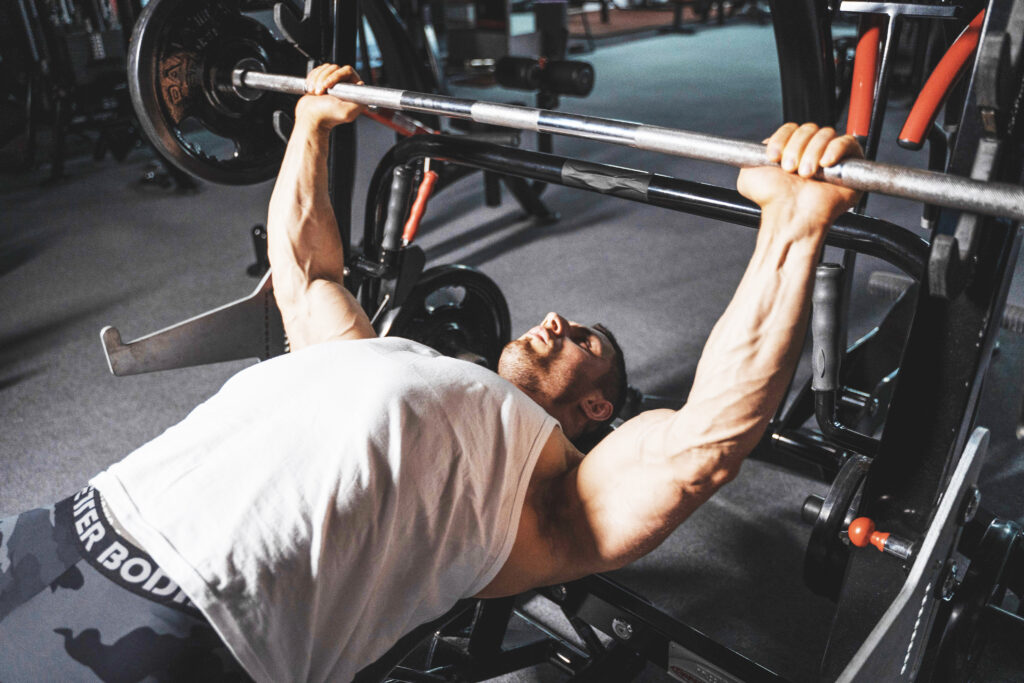
The bench press is a cornerstone of strength training, primarily targeting the chest, shoulders, and triceps. It’s a versatile exercise that can help you build muscle, improve strength, and enhance athletic performance. In this article, we’ll explore the advantages of bench press and why it’s such a popular movement in fitness routines.
Advantages of Bench Pressing
- Chest Development
The bench press is well renowned for its ability to build the pectoral muscles. It helps create a well-defined and strong chest, which is often a goal for many lifters. - Shoulder Strength
This exercise also engages the deltoid muscles in the shoulders, contributing to overall shoulder strength and development. - Triceps Activation
The triceps are heavily involved during the extension phase of the bench press, making it an effective exercise for building triceps strength. - Stabilization
The bench press requires the stabilization of the entire body, engaging muscles in the core, legs, and back. This promotes overall stability and balance, which are crucial for other physical activities. - Compound Movement
The bench press is a compound movement that works many joints and muscle groups at the same time. This efficiency makes it a great exercise for targeting various muscle groups in one motion. - Improved Upper Body Strength
Regularly incorporating the bench press into your routine can lead to increased upper body strength, beneficial for various activities and sports. - Bone Health
Weight-bearing exercises like the bench press contribute to improved bone density, particularly in the upper body, which is vital for overall health. - Boosts Metabolism
Because it’s a demanding compound movement, the bench press may elevate your metabolism, which can support efforts in managing body weight.
To sum up the advantages of bench press, it’s clear that this exercise supports strength, muscle development, stability, and even bone health—making it a smart addition to nearly any workout regimen.
Importance of Proper Form
Proper form is crucial to prevent injuries. If you’re just starting out with bench pressing or strength training, it’s best to begin with lighter weights and slowly progress as your technique and confidence improve. Consulting with a fitness professional or healthcare provider is advisable, especially if you have existing health concerns.
Proper Way to Perform a Bench Press
To execute a bench press correctly:
- Lie on a bench, feet flat on the floor.
- Grip the barbell slightly wider than shoulder-width apart.
- Lower the bar to your chest, keeping your elbows at about a 45-degree angle to your body.
- Press the bar upward until your arms are completely straight.
- Don’t let the bar rebound off your chest—pause for a moment before pushing it back up.
Key Points to Ensure Correct Form
- Pause: Lower the bar until it nearly touches your chest, then push it back up.
- Focus: Keep your gaze fixed on the ceiling at the top and your chest at the bottom.
- Grip: Squeeze the bar firmly to improve stability and control.
Common Bench Press Questions
How Much Weight Should a Beginner Bench Press?
A typical male novice might start with around 135 pounds, while a female novice could begin with about 65 pounds. These are just averages, so individual capabilities will vary.
What to Do If You Feel More in Your Arms Than Your Chest?
If the bench press feels like it’s working your arms more than your chest, your elbows might be positioned too far outward. Try keeping them closer to your sides and concentrate on activating your chest muscles during the lift.
Why Do My Shoulders Hurt When I Bench Press?
Shoulder pain during the bench press often indicates poor form. Make sure your shoulders are pulled back and down, and think about getting a fitness expert to check your form for any issues.
Is It Okay to Bench Press on Consecutive Days?
It’s generally not advisable to work the same muscle groups on consecutive days. Muscles require time to recover after intense workouts, particularly with heavy lifts like the bench press.
How Long Should I Rest Between Sets?
For optimal strength development, rest intervals should range from 2 to 5 minutes between sets. This allows sufficient recovery for the muscles to generate maximum force in subsequent sets.
Conclusion
Maintaining proper form while bench pressing is essential for preventing injuries and maximizing results. Beginners should start with weights they can handle comfortably, then slowly increase the load as their strength and form get better. The advantages of bench press go beyond muscle growth—they include increased strength, enhanced metabolism, and improved posture and bone health. By including this powerful exercise in your routine, you can achieve significant gains in muscle strength and overall fitness.
Helpful Equipment for Bench Press Training
(Affiliate Links)
To safely and effectively experience the advantages of bench press, having the right equipment can make a significant difference. While not mandatory, the following types of gear are commonly used by individuals to support their bench press workouts:
- Weight Bench – A stable and adjustable bench allows for a variety of bench press variations and helps maintain proper form. View options on Amazon.
- Barbell and Weight Plates – Standard or Olympic barbells with appropriate weight plates are essential for progression. Browse barbells and weight sets.
- Wrist Wraps or Lifting Gloves – Some lifters find additional wrist support or grip protection helpful, especially when lifting heavier weights. Explore wrist wraps and gloves.
- Resistance Bands – Useful for warm-ups, mobility drills, or adding variable resistance to your pressing movements. See resistance band sets.
When selecting equipment, consider factors such as your experience level, available space, and training goals. Many of these items can be found through online retailers, including Amazon and sporting goods stores.
Disclaimer:
As an Amazon Associate, I earn from qualifying purchases made through the links above at no extra cost to you. These links help support the creation of content like this, and I truly appreciate your support!
